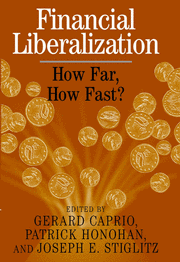4 - Financial Liberalization and Financial Fragility
Published online by Cambridge University Press: 12 January 2010
Summary
INTRODUCTION
While the link between financial development and economic growth has been documented through careful empirical studies, the connection between financial liberalization and financial fragility has not been the object of systematic econometric investigation so far. This chapter is an attempt to fill this gap.
Financial liberalization, by giving banks and other financial intermediaries more freedom of action, can increase the opportunities to take on risk, thereby increasing financial fragility. This is not necessarily bad for the economy, as high-risk, high-returns investment projects may dominate low-risk, low-return ventures. However, because of limited liability compounded with other forms of implicit and explicit guarantees, bankers' appetite for risk is likely to be greater than what is socially desirable. If prudential regulation and supervision are not effective at controlling bank behavior and at realigning incentives, liberalization may increase financial fragility well above what is socially desirable. Also, to the extent that the skills to screen and monitor risky borrowers and to manage a risky loan portfolio, as well as the skills to perform efficient supervision, can only be acquired gradually and through “learning-by-doing,” banks in newly liberalized systems are likely to be more vulnerable.
All these considerations suggest that, other things being equal, the risk of bank insolvency and, more generally, of systemic banking crises may be greater in liberalized financial systems. This chapter presents econometric tests of various aspects of this linkage.
Building upon our previous research on the determinants of banking crises (Demirgüç-Kunt and Detragiache 1998), we construct a financial liberalization dummy variable for a large number of developed and developing countries during 1980–95.
- Type
- Chapter
- Information
- Financial LiberalizationHow Far, How Fast?, pp. 96 - 122Publisher: Cambridge University PressPrint publication year: 2001
- 45
- Cited by



